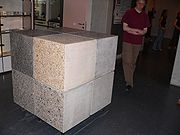|
|
How Big is a Cubic Meter in International Shipping?
The above U.S. LCL online freight calculator lets you quickly estimate ocean freight costs for goods exported from the United States. Select your destination country to begin.
In Less-Than-Container-Load (LCL) freight, overseas transport pricing is typically calculated based on cargo volume in CBM or feet rather than by mass.
A cubic (CBM) meter is the standard unit of volume used in global cargo transportation. However, sea freight from the USA is often measured in cubic feet.
One cubic meter is approximately equal to 35.3 cubic feet (CBF). Look at the picture to understand the size of a cubic meter.
- A CBM is a volume that your packed goods can fill in a space limited by one meter wide, one meter in length, and one meter in height, OR ~ by 39" wide, 39" in length, and 39" in height.
- One metric meter ~ 3.28 metric feet.
- One unit of CBM ~ 35 CBF.
In international logistics, a cubic meter represents a significant volume. When exporting goods from the USA in boxes, you can consolidate multiple boxes of various sizes into a single volume unit.
Look at the picture. Imagine how many boxes you can fit into one CBM. Click it to watch a YouTube video and see the total volume: just one cubic meter.
When shipping overseas via LCL, international freight rates are determined by the spatial dimensions, measured in CBM (cubic meters) or CBF (cubic feet). This means that the physical weight of the goods typically does not affect the pricing. In most cases, you can disregard the heaviness of your shipment.
However, shipping quotes for the ground transportation portion of multimodal logistics are based on weight, measured in either kilos or pounds.
Cubic Meter in LCL
LCL is the most economical way to ship large palletized loads from the United States to overseas destinations. The advantage of consolidated sea freight is that, typically, the cargo's weight is not a pricing factor and does not affect final delivery costs.
*Does not apply if you ship a high-density load where the weight-to-volume ratio exceeds a density limit assigned to a particular routing. However, if you ship regular commodities, then the shipment mass shouldn't exceed the density limit.
In other words, unlike parcel services or air freight, LCL shipping prices are based on volume per CBM (or CBF in the USA). As a load is delivered at sea carriers' terminals (called CFS—Container Freight Station), shippers should not worry about the weight of the load. If LCL is utilized, the cargo weight typically does not affect international shipping charges.
You can find more information on calculating CBM when moving goods from the U.S. to other countries.
The W/M Rules in Respect of Multimodal Cargo Transportation
W/m stands for "weight or measurement." It is a term used in global shipping and U.S. domestic cargo transportation that sets a maximum density limit.
In maritime transport, freight rates for standard shipments are based on the total volume rather than the weight. However, for extremely heavy shipments, rates are adjusted based on the shipment's weight. W/m calculations can vary by cargo transport mode and carrier.
Shippers should be aware of the rules for calculating chargeable weight and volume (W/m) for various types of logistics services. The two primary methods for partial container loads from the USA are international (LCL) and U.S. domestic (LTL, Less Than Truckload) methods.
LCL: Cargo vessel capacities are typically based on available space, rather than weight. If you deliver your shipment directly to an ocean carrier terminal (CFS), you can ignore the weight, and the rates will be calculated based on CBM or CBF.
A density limit is known as "w/m—weight or measurement, whichever is greater," for heavy freight. This limit can vary depending on the shipping vessel, carrier, and local regulations. When sending goods from the U.S. by sea, this limit can have a particularly significant impact on shipments to the Caribbean and Central America.
Most regular commodities will not exceed the density threshold. When shipping overseas from the United States to other countries via LCL, remember the "U.S. 45 lbs Rule," which states that 45 lbs equals one cubic foot. Suppose the load density exceeds 45 pounds per cubic foot (CBF). In that case, the chargeable volume will be calculated using the following formula: Total cargo weight in pounds divided by 45 equals the taxable volume in cubic feet.
There is a similar rule for metric measurements: "1 CBM = 1000 kilograms." However, the w/m limit can differ by vessel or carrier. Sometimes a cubic meter may equate to 750 or even 500 kilograms. Considering the weight-to-volume limit for heavy loads is essential.
For U.S. domestic LTL ground transportation, costs are based on actual weight (in kilograms or pounds) and should be listed separately from sea freight rates. This also applies to LCL shipments, which U.S. trucking companies typically manage.
LTL regulations are stricter than LCL, and all trucking loads must be weighed. The chargeable weight for LTL is calculated using this formula: Chargeable Weight (lbs) = Max of (Actual Weight OR (Length x Width x Height in inches) ÷ 194).
Transportation costs and dimensional weight depend on the freight class, which varies by the type of goods. Please refer to the link for details on dim weight and shipping classes.


.png)




